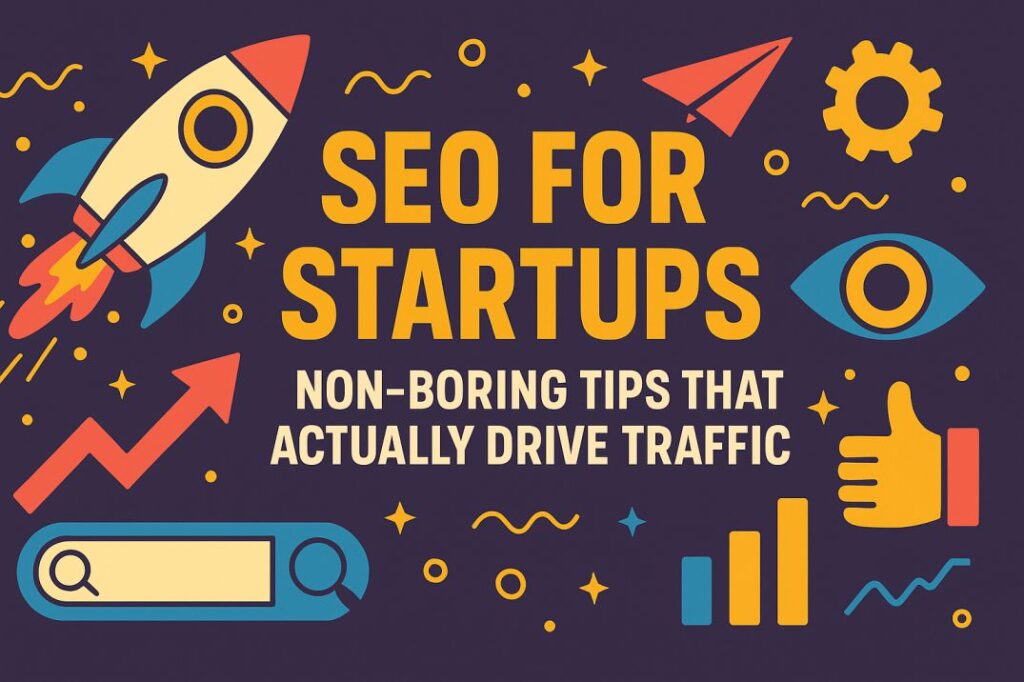Let’s get real.
SEO isn’t just a checkbox on your startup’s to-do list—it’s your lifeline to free, organic traffic. But here’s the deal: the internet is bloated with the same recycled tips. “Use keywords.” “Write great content.” Yawn.
This guide? It’s different.
We’re talking non-boring, no-fluff, zero-cringe, actually-useful SEO tips that’ll help you rank higher, get noticed, and attract users who care about what you do.
Ready? Let’s kick the dull out of SEO.
1. Forget Keywords. Start With People Problems 🧠
Sure, keywords matter. But you know what’s better? Solving actual problems.
Instead of Googling random keywords, ask:
- What questions are people asking in Reddit threads?
- What’s annoying your ideal customer today?
- What would you Google if you were them?
Tool tip: Use AnswerThePublic and Reddit search to find real questions.
Pro move:
Turn one question into 10 long-tail blog ideas. Long-tail = low competition + laser-focused traffic.
2. Turn Your Team into SEO Ninjas (Without Making Them Blog) 🥷
Got a team? Use them. But don’t force your developer to write 2,000 words on customer onboarding.
Instead:
- Ask them to record a 10-minute explainer video.
- Extract quotes and insights.
- Turn that into blog posts, LinkedIn carousels, and FAQs.
Bonus: Google loves unique content. So your quirky engineer explaining your SaaS onboarding flow = SEO gold.
3. Steal Traffic (The Ethical Way) With Strategic Reverse Engineering 🕵️
Let’s talk competitive intelligence (a fancy way of saying “digital snooping”).
Here’s the play:
- Use Ahrefs, Ubersuggest, or SEMRush.
- Plug in your competitor’s URL.
- Find which low-difficulty keywords are bringing them traffic.
- Write 10x better content on those topics. Be funnier, clearer, faster, deeper.
Tip:
If your competitor wrote “10 Tools for Managing Remote Teams,” you write:
“11 Actually Useful Tools for Remote Teams (And 2 That Are Totally Overrated)”
4. Make Google Fall in Love With Your Weirdly Helpful Content 💌
Google is like that picky friend—it only recommends stuff that’s:
- Super relevant
- Easy to understand
- Useful AF
So do this:
- Add “TL;DRs” to your posts for lazy readers.
- Use images, GIFs, and memes to explain dry stuff.
- Create step-by-step how-tos, checklists, and free tools.
Secret sauce:
Unique formats = backlinks. Create stuff people want to embed or share, like templates or calculators.
5. Update Old Stuff Like a Pro Time Traveler ⏰
Don’t let your old blog posts die a slow, forgotten death.
Every 3–6 months:
- Revisit them.
- Update stats, links, and screenshots.
- Improve readability.
- Add new insights.
Then hit Update and watch Google crawl it like it’s brand new.
Bonus:
Change the date in the meta description to reflect the update—your CTR will thank you.
6. Don’t Just Write—Design for SEO 🎨
You can write the best post ever, but if it looks like a 2003 Geocities page, no one will stick around.
Design for readers and robots:
- Use short paragraphs (2–3 lines max).
- Add H2s, H3s, bullets, and bold text.
- Make your CTA buttons visible but not obnoxious.
- Mobile-first. Always.
Pro tip:
Use tools like Hotjar to see how users interact with your pages. Tweak accordingly.
7. Say Hello to Schema. Even If It Sounds Boring 🧩
Schema markup is like giving Google a cheat sheet on your content.
Implement:
- FAQ schema for Q&A sections
- Review schema for testimonials
- How-to schema for tutorials
Don’t worry—it’s easier than it sounds. Tools like Merkle’s Schema Markup Generator can help you copy-paste in 5 minutes.
Why bother? Because:
- Schema = Rich Snippets
- Rich Snippets = More clicks
- More clicks = Traffic party 🎉
8. Go All In on One Platform (Then Repurpose Like Crazy) ♻️
Startups get SEO FOMO. You don’t need to be on every platform.
Pick one core content type:
- Blogs?
- YouTube?
- Podcasts?
Then repurpose like a beast:
- Blog post → Twitter thread → Newsletter → LinkedIn post → Instagram carousel
This builds authority across channels and earns juicy backlinks.
9. Build Links Without Being Weird About It 🔗
No one likes a “Hi can I get a backlink?” cold email.
Here’s how to earn links naturally:
- Do original research (even a tiny survey helps).
- Build a free tool or calculator.
- Write guest posts on niche blogs.
- Be active on Product Hunt, Indie Hackers, and communities in your niche.
Ninja trick:
Find journalists who cover your industry on Twitter/X. When they need a quote, be ready with a short, punchy response—and your link.
10. Track What Actually Matters 📊
Pageviews are cute. Signups and conversions? Sexy.
Use tools like:
- Google Search Console – to see which keywords are working
- Plausible or GA4 – to track traffic & bounce rate
- Hotjar / Microsoft Clarity – to watch users in the wild
Tie SEO to real business outcomes. Because traffic is fun, but paying users are better.
TL;DR: Startup SEO Doesn’t Have to Suck 💡
Here’s your cheat sheet:
✅ Solve real problems, not just target keywords
✅ Turn your team’s brains into content without boring them
✅ Ethically steal what’s working for competitors
✅ Create standout, helpful, Google-loving content
✅ Update old stuff like a content wizard
✅ Make it look GOOD (your design matters)
✅ Use schema markup like an SEO secret weapon
✅ Focus on one platform, repurpose the heck out of it
✅ Earn links without begging
✅ Track real results, not vanity fluff
Final Word: SEO Is a Long Game—But Startups Can Win It 🏆
You don’t need a 10-person SEO team or a six-figure budget. You need curiosity, a dash of creativity, and a willingness to try non-boring stuff.
SEO rewards those who play smart, not safe.
Now go out there and rank like a rebel. 🔥

